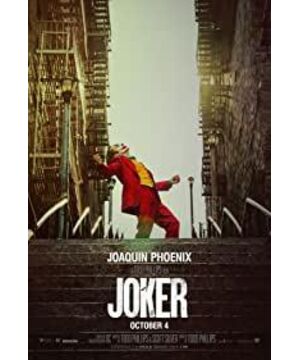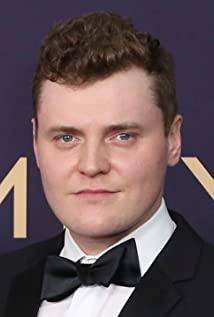"Joker" is an extremely mediocre film.
It is definitely not the mediocre domestic movie that has no bright spots and makes people complain. Even, this movie has reached the Oscar level in terms of character creation, atmosphere, music, rhythm, and photography. Its mediocrity lies in the fact that its many strengths cannot hide its extremely empty core: except to say "the world is so festering" and add a little joke - "life is a tragedy in the near view, but a comedy in the long run" (this sentence is also at the wine table). I can speak, and I often hear it)—other than that, nothing more is said.
The problem with the film is on both the character and reality level.
(Below is the spoiler divider)
The character's problem (not the actor's problem, but the script problem)
I can't agree more with the media hype for the character building. Phoenix's performance is flawless (I've always been a fan of his), the problem is the script's portrayal of the Joker. The image of the Joker is very one-dimensional in the movie. Two reasons: lack of change in characters, lack of depth in characters; sudden change, lack of motivation.
Say the first
Arthur has always been a clown.
According to Jung's theory, shadows are formed by judgments and feelings in the personality that are suppressed by secular morality (or personal morality). Shadowing doesn't have to be a bad thing (for example, if you are often issued a good person card, it means that your shadow personality is better, more competitive, and more active than you, just because you can't cast it), it just means that the other person's personality. part of the unreleased potential. A very good example of the shadow personality in the film and television works: "The Coquettish Lawyer". The series took 4 seasons to portray Jimmy's shadowy personality (actually a reflection of his brother's attitude towards him, and expanded into the hostility of the whole world towards him), and ended with an episode of his complete blackening , very convincing and authentic. That is to say, the relationship between the shadow personality and the main personality is that their views, attitudes, and judgments about key things are different, or even completely opposite. Jimmy loves his brother, but he does everything he can to suppress him. So when the opportunity comes, the shadow personality will take the opportunity to gain the upper hand. "The Coquettish Lawyer" is good, not because we agree that Jimmy is a good person, but because his personality structure is no different from ordinary people, everyone is complicated, and it is our choices that make us. Jimmy's choice, and possibly ours (choosing to treat others with hatred in order to overcome psychological barriers).
Obviously, Arthur and the Joker are two different personalities of the protagonist, which can be seen from his dominant hand (as other film critics have pointed out, Arthur writes jokes with two hands that are different, and he kills people. left hand, etc.). However, in the movie, Arthur's sense of existence is very low ("I doubt if I ever existed"), and the clown has always had the upper hand (especially after killing three financial men), which means that Arthur is not the main character at all, He is nothing but a mask "to not disturb others, always pretending to be normal" (Jung believed that persona means both mask and personality). That is to say, from the beginning of the movie, there is no binary opposition, and the same old driver is always driving. Therefore, there is no process of "character change and gradual enrichment" in the film, only some "hints" - he initially thought that his "crazy laughing syndrome" was a disease, but later found that it was just a manifestation of the emergence of personality. There is only one difference between Arthur and the Joker: Arthur has a certain empathy, desires to be accepted by society, and does not hurt others, while the Joker has no worries. That is to say, the difference between the two is only the "bottom line", and the movie broke it with only one scene (shooting the financial man). This setting leaves the Joker devoid of content, but merely an unsympathetic evil being.
This leads to the second problem. Intrinsic lack leads to fatalism —the lack of motivation for changing the character's intrinsic motivation, throwing all opportunities for change to external factors.
The cause of Arthur's mental illness may be social (Karen Honey believes that diseases such as schizophrenia arise from the inability of people to be themselves ). The movie also gave a lot of evidence: Gaotan citizens are struggling to live, the crime rate is high, and their hatred for the rich is serious. Some major turning points: Losing jobs, killing people on the subway, people starting to wear clown masks on the streets, being humiliated by Wayne and discovering his mother's paranoia (motherkilling), being on Murray's show (symbolically paternal killing). Which is the node where Arthur transforms into the Joker? Yes, and neither. No node is decisive, the audience does not think that the protagonist "chooses between A and B", instead, they just hang in anticipation, whether he will kill, whether he will go berserk, etc. ( This gives the movie a comic book feel). He did, a stone fell, violence was presented, and that was it. We know that the ending is like this (becoming a joker), but in the process, there is no plot that shows that the ending is the result of the interaction between the character's own characteristics and the environment.
Is there something wrong with the fatalistic tone? I think the audience's identification with this film is that the **'s resistance to fatalism (whatever way it takes it) will become another accepted fatalism. ** Just like hating the rich is natural justice, or the mistress should not die, it becomes a kind of original PC (political correctness), which is more likely to resonate. Yeah, the world is so fucked up, why not destroy it? The world is not worth it, why not indulge in pleasure? What about provocation, at least there is an outlet for emotions. **Yes, I may be the same as you, admitting that value is hard to exist in a broken world, but this does not mean that ignoring the violence of the object, cruelty is the fate of you and me (otherwise you would not watch it here My movie reviews, I wouldn't write them either, we all went to the streets). We are not robots, and we do not have to choose "Those violent delight, have violent ends." We are human beings, and because human beings have choices, the fate of the fate (whether it is Greek or Indian) cannot explain why humans are here.
The question of drama and reality
"Parasite" and "Joker" have these same problems. The blackening process is very simple, rough, without any inner turmoil, and without hindrance. Class contradictions are magnified to the point of absurdity (although this is also a reality), but the biggest problem is that the irreversible ending implied by fate is really unacceptable to me. At least, I wouldn't think it's worth sacrificing the death of an innocent person in exchange for xx's death, which is fundamentally against the very foundation of being human.
That's a big reason why I don't like Joker. I never use "three views" to evaluate movies. I like the clowns and two-faced people in "The Dark Knight", because their existence awakens the world, human nature is volatile like water, and evil is by your side. I liked the depiction of a psychopath in "Jack Made This Room" because it revealed a paranoid and understandable pursuit. But "Joker" packs evil into a strange and magnificent existence, an art with a unique personality, which makes the common people worship it. What I'm trying to say is that it's dangerous when we don't understand evil, but we worship it.
I can imagine a person watching this movie with anger at reality, giving 5 stars, cursing the world, going back to work the next day, exploiting subordinates, and being violent to partners. I can imagine how many people have the Joker as their totem, like V and Assange, believing that rebellion can make waves. But I think the symbol of the clown is very different, it is a representation of absolute chaos, a cult and reverence for death, an anarchist philosophy of living to death, it is not worth emulating and worshipping, not even worthy of a glimpse, Not worth arguing. In the world of clowns, there is no limit to all evil, and I don't believe that anyone can laugh out loud in this world. Maybe the next second, you yourself will be the "price" of change. Yes, I think other 5-star movie reviews are very conservative, analyzing the film's scheduling and editing, still can't hide the fact that you agree with Joker (a rough conclusion). I want to agree too, but I'm still scared - isn't there enough violence in this world?
Joker personalities are in the hearts of many people, and this movie just summons them. There are many ways to look at evil, but standing on the side of hating and cursing reality, ignoring the "evil" of one's own behavior, and ignoring one's actions as part of the "evil" will definitely not be a good thing. While we cursed xxx, cursed the system, the wall, and hoped that the world would fall apart, we hoped to preserve ourselves. I'm sorry, the world is very difficult to do. Because the world is made up of you and me, hatred only adds to harm. As long as you intend to sacrifice others, not yourself, that touches on the nature of evil.
The evil of the clown is a superficial and mediocre evil, a complaint and abhorrence of the world, an evil that longs for the freedom to lose control and abandon everything, and a negative freedom pushed to the extreme. It accomplishes nothing, no one, it dissolves human identity, zz, it destroys everything, destroys humanity with a death wish. "Death Stranding" also gave at least two endings, giving the protagonist a chance to save. "Joker" believes that reality is hopeless. For a long time, this fatalistic mood, the desperation of reality, will definitely overwhelm yourself first, and who knows what will happen in "Legal News".
I believe the Joker (and shadow personality) exists in you and me (yes, I've seen it), and that's not a good thing. There is mutual abuse in forums, in the distinction between "us" and "them", in the frenzy, in the misreading of Nietzsche. Approving such evil, appreciating it and projecting it, is tantamount to adding fuel to the fire in the present world.
"Thirteen Invitations" has an interview with modern artist Xu Bing. He commented that "The Thirteen Hairpins of Jinling" was bad because of "misjudgment about the progress of civilization". I think Joker is the same. Yes, the world sucks, I admit, but are we left to make it worse? We have to get over it, but not in this way in the movies.
View more about Joker reviews










